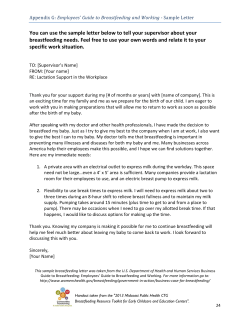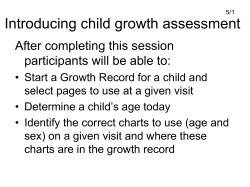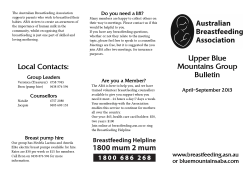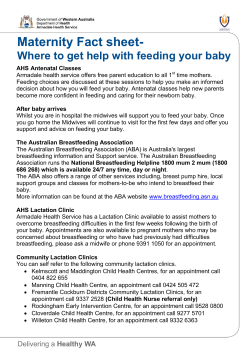
Impact of skilled IYCF counseling on breastfeeding practices
RESEARCH BRIEF Series 5, April 2015 Impact of skilled IYCF counseling on breastfeeding practices in District Patiala!! Background Globally breastfeeding has proven to be the foundation of child survival, nutrition and early childhood development. Over the years breastfeeding has been found to significantly reduce the neonatal and thereby the child deaths. It has been estimated that, breast feeding alone may reduce the child mortality by 13%. In contrast, complementary feeding to support it has been shown to reduce stunting significantly. To put it simply, promotion of optimal feeding practices improves the breast feeding rates and there by the child mortality. It also ensures better complementary feeding which indirectly improves the under nutrition and thereby the child mortality. In Punjab one of the biggest states in India, infant mortality as per NFHS‐3 is estimated at 42 deaths/ 1000 before the age of one year and the under‐five mortality rate for Punjab is 52 deaths per 1,000 live births. The NFHS‐3 rates imply that, more than 1 in 24 children in Punjab still die within the first year of life, and 1 in 19 die before reaching age five. In view of this situation Punjab Government under National Rural Health Mission signed a MOU with Breastfeeding Promotion Network of India (BPNI) in the year 2008‐2009 to build the capacity of their health system staff and field workers with an aim to enhance skilled infant and young child feeding counseling practices in State. Subsequently, BPNI deputed their national trainers for a 6 days infant and young child feeding (IYCF) 3 in 1 counseling training course to create Middle Level 1 | P a g e Trainers (MLTs). These trained MLTs further conducted a 3‐days training for front line worker (FLW i.e. ANM/ASHAs) on IYCF counseling. By 2012, BPNI had trained all the 20 districts in Punjab. The training course built the capacity of 1,299 MLTs and 17202 FLW (ANMs/ASHAs) in the State. After the successful completion of this project in the year 2013 BPNI conducted an impact assessment study in district Patiala, Punjab, India. This paper showcases the outcomes of this impact assessment study. Objectives a) To assess the magnitude of knowledge and skills acquired during these trainings. b) To assess the utilization of the acquired knowledge and skills in the community. c) To assess the impact of skilled counseling services on IYCF practice indicators. Design and setting The survey was conducted in Dhudhan Sadhan, one of the blocks in Patiala district, using systematic random sampling. Three villages namely Sannor, Peepal Khedi & Sawai Singh were randomly selected for the household study. A total of 100 mothers with infants 0‐12 months of age group were interviewed along with 20 FLWs (10 ANMs & 10 ASHAs) and 10 MLTs (trainers) such as doctors/staff nurses were interviewed. The district family welfare officer was also interviewed. Conclusion MLTs outlook The middle level trainers (MLTs) found the training useful and excellent. This has improved front line workers (FLWs) knowledge and skills tremendously on infant and young child feeding practices and now they find themselves having more confidence and better understanding on IYCF. Similarly, front line workers also found that training has improved their interpersonal and communication skills and has had a substantial impact on the community. Majority of MLTs felt that though the training has improved both the ANMs and ASHAs knowledge but it is more constructive for ANMs as compared to ASHAs. Due to their lower level of education they are unable to utilise the training skills appropriately. MLTs recommended conducting a separate training programme for ASHAs and AWWs at CHC level as they frequently make home visits and interact more with mothers on one to one basis. They have suggested that there should be refresher training programmes at regular intervals for front line workers. Future training should largely deal with practical clinical and hands on practice. Both MLTs and FLWs found the course content to be relevant, sessions and training time were adequate and role play was the most effective training style. Similarly, positioning baby at the breast & attachment, management of breast condition, demonstration through role play, clinical practice at PHC and feeding techniques were the most liked session during training. According to front like worker (FLWs) flipchart is the most appropriate training material used for counseling the pregnant and lactating mothers regarding infant and young child feeding practices. District Family Welfare Officer’s outlook According to the District Family Welfare Officer of Patiala IYCF training has improved awareness about the benefits of breastfeeding. It has a substantial role in reducing the Infant Mortality Rate (IMR) at the district level. Now there are no infant deaths reported resulting from faulty feeding practices as there has been improved awareness and knowledge amongst ASHAs. He stated that initiation of breastfeeding has improved due to training of ANMs and ASHAs, exclusive breastfeeding rates has gone up due to regular counseling. He suggested the need for more training programmes of shorter duration to refresh the knowledge and practices of front line workers. Similarly, counseling needs to be continuous to improve breastfeeding rates in the community. 2 | P a g e Comparative table of Infant and Young Child Feeding Practices Initiation of breastfeeding within one hour of birth Exclusive breastfeeding up to the age of six months Introduction of solid, semi‐solid or soft foods Minimum meal frequency Minimum dietary diversity Minimum acceptable diet NFHS‐ 3 10.3 DLHS‐3 44.6 Present Study 62 36.0 32.4 72 50.0 68.9 61.7 32.7 ‐ 40.7 39.9 ‐ 19.1 21.2 ‐ 10.6 Utilization of training skills by the front line workers in the community According to the study FLWs are utilizing their training skills while counseling and communicating with pregnant and lactating mothers during home visits, immunization days, antenatal and postnatal check‐ups. They were very confident about the utilization of their training skills to motivate, encourage the mothers for breastfeeding and resolve the mother’s breastfeeding problems in the community At the same time it was observed that they lack knowledge about complementary feeding. Though they advice khichdi, daliya, mashed rice, boiled potatoes and suji kheer, liquid foods like dal ka pani, rice water as common food but no practical demonstration is done to acquaint mothers on diversity, frequency and consistency of food to be given to the child after six months. The study also indicated that FLWs were not confident and clear in dealing with insufficient milk supply and painful breast/ nipples. Correspondingly, knowledge on flat or inverted nipples, sore & fissured nipple and engorgement appeared to be inadequate and they don’t feel self‐assurance enough to resolve the above breastfeeding problems. These aspects may be discussed more rigorously during training courses. Impact on the Community In the present study, the analysis shows that 85% of the mothers received skilled counseling services on IYCF practices during their antenatal period and most of them were advised by front line works (ANM/ ASHA) and doctors/ nurses. Most (62%) of the mothers initiated breastfeeding within one hour of birth. Out of these, most (69%) of them were advised by the doctors /nurses, 33% were advised by the front like workers and 4% were informed by the mother and mother‐in‐law. 22% of mothers were still giving prelacteal feed in the form of Janam Ghuti, milk other than mother milk, tea and sugar during the first 3 days of life. Study showed 72% of mother’s exclusive breastfed to their infants. Although 81.5% of mothers were informed about the age of starting complementary feeding during the antenatal period but timely introduction of complementary feeding was only practiced by 61.7% mothers. The practice of minimum meal frequency, minimum dietary diversity and minimum acceptable diet were inadequate which is very crucial for appropriate IYCF practices. Only 19.1% children were fed four or more food groups, 40.7% were fed minimum numbers of times, as a result only 10.6% of children aged 6‐12 months received minimum acceptable diet. This showed that complementary feeding practices are hampered due lack of knowledge and ignorance which need to be focused more. Recommendations 1. States need to conduct refreshers training program on IYCF counseling skills for both MTLs and FLWs at regular intervals and orientation training for the new staff. 2. Frontline health workers need to be reoriented on appropriate IYCF practices, aids and counseling skills with a special focus on complementary feeding practices (food frequency, consistency and diversity). 3. Regular monitoring and evaluation of all the FLWs is required to reinforce the counseling skills and to improve the quality of services they provide in the community. 4. State governments should conduct impact assessment studies to improve and excel the skills of their health system staff. BPNI Research Team: Dr.Arun Gupta, Dr.J.P.Dadhich, Dr.Shoba Suri, Dr.Neelima Thakur, Nupur Bidla Breastfeeding Promotion Network of India (BPNI) BP‐33, Pitampura, Delhi‐110034. India Tel: +91‐11‐27343608, 42683059. Tel/Fax: +91‐11‐27343606. Email: bpni@bpni.org . Website: www.bpni.org BPNI is a registered, independent, non-profit, national organisation that works towards protecting, promoting and supporting breastfeeding and appropriate complementary feeding of infants and young children. BPNI works through advocacy, social mobilization, information sharing, education, research, training and monitoring the company compliance with the IMS Act. BPNI is the Regional Focal Point for South Asia for the World Alliance for Breastfeeding Action (WABA) and Regional Coordinating Office for International Baby Food Action Network (IBFAN) Asia. As, a policy, BPNI does not accept funds of any kind from the companies producing infant milk substitute, feeding bottles, related equipments, or infant foods (cereal foods) or from those who have been ever found to violate the IMS Act or the International Code of Marketing of Breast-milkSubstitute or from organization/ industry having conflict of interest. 3 | P a g e
© Copyright 2025









